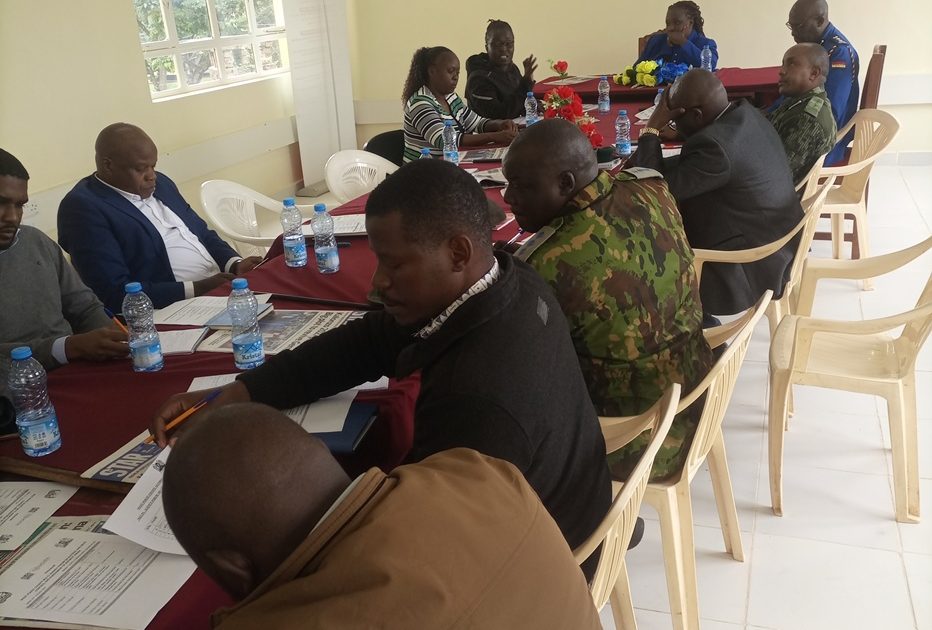The Inter-agency team tasked to deal with alcohol and drug abuse in West Pokot County has been asked to embrace extensive sensitisation models in a move to help stamp out the vice.
During the West Pokot County Inter-agency team meeting on Alcohol and Drug Abuse Control and assessment of hotspots organized by the National Authority for Campaign Against Alcohol and Drug Abuse (NACADA) at Kapenguria, the team was told that alcohol and drug abuse was messing many families’ socio-economic foundation, thus the need to engage widely to assist the government serve its people better.
Scola Komen from NACADA, which is the secretariat to the forum, said there was a need to move around schools with sensitisation messages on positive schooling and parenting.
“The fight against alcohol and drug abuse can be effectively done at a tender age amongst children. A multi-agency team is effective because there will be no finger pointing, hence success in ensuring directives is adhered to,” advised Komen.
She called on the multi-agency team to up their game for effective adherence to government directives regarding the fight against alcohol and substance abuse.
NACADA intends to have desk offices in every county with Turkana and Baringo Counties being on the most urgent list for the ultimate goal of increased sensitisation among the locals and the business community regarding the liquor laws.
A report from the County Liquor Licensing Board revealed that there were a total of 126 registered alcohol outlets, with West Pokot Sub County having a huge share of 102 outlets within Makutano Centre and its environs.
The board Secretary Moses Khaemba noted that there were some hotspots within the area, where drugs and illicit brews were being peddled and the reports have been forwarded to the relevant authorities for action.
“Alcohol outlets are concentrated within Kapenguria Municipality and after vetting following the presidential directive only 24 within the sub county met the requisite standards.
Chepareria Town, which is Kipkomo Sub County also has several alcohol outlets, but currently the most substance being abused is miraa and mugoka,” stated Khaemba.
The board said it was grappling with the smuggling of alcohol products from the neighbouring country of Uganda owing to the porous border that has made it difficult for law enforcement.
“In Kacheliba Sub County there are 8 outlets and it is sorry to state that almost all liquors in stock are from Uganda, which consumers claim are cheaper as compared to the Kenyan brands, hence a liking for them. We even have unregistered outlets operating in people’s homesteads or under trees making it elusive to track them,” he observed.
Smugglers of the alcoholic drinks from the neighbouring country seem to be very cryptic, especially with the use of motorbikes to evade police dragnets, the committee was briefed.
Kacheliba Sub County Police Commander Lawrence Marua who is barely a month in the station said he has received briefs and stringent operations are underway to ensure cross border transportation of contraband goods is stopped.
He added that the brands have been spread to even other parts of the county including Pokot Central Sub County, where there are 6 outlets at Sigor Market.
Pokot South stands out to be a centre of excellence as far as alcohol and drug abuse is concerned, since there is no single alcohol outlet with revelers either having to travel to other sub counties or embracing takeaway services since drunkards may be spotted.
“We conducted several public participation forums across the sub county and residents stood their ground that no licensing of alcohol outlets will be allowed. They said if one wants to enjoy their hard drinks they better travel to other places and not within the area,” Khaemba revealed.
The committee chaired by West Pokot Assistant County Commissioner Emily Ogolla on behalf of the County Commissioner Abdullahi Khalif, agreed that all unlicensed bars be closed down.
Ogolla urged the Office of the Director of Public Prosecutions (ODPP) to ensure the suspects are captured by their official names as they appear on their national identity cards so that repeat offenders can be blacklisted.
The committee was also informed that some notorious illicit alcohol sellers have some form of a merry-go-round where they contribute funds to bail out their colleagues whenever they are faced with the law, hence making it a routine with their illicit business.
By Richard Muhambe




